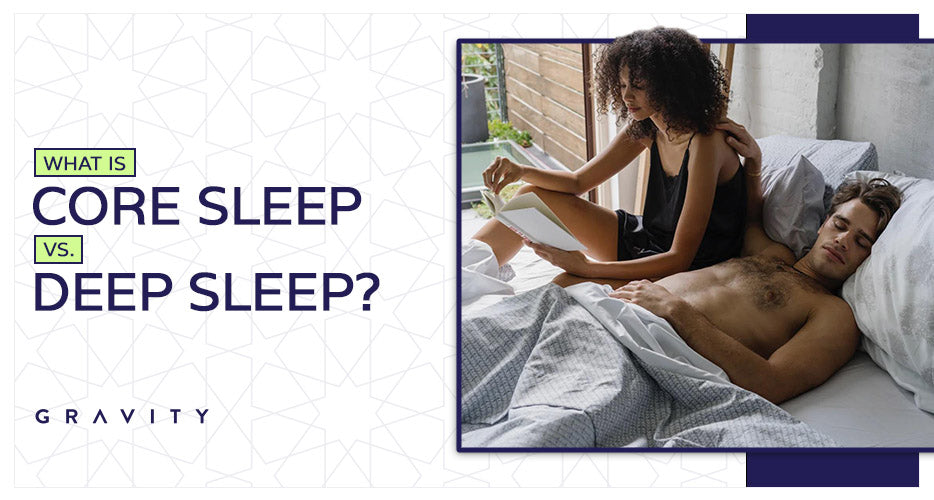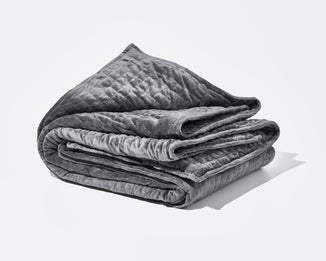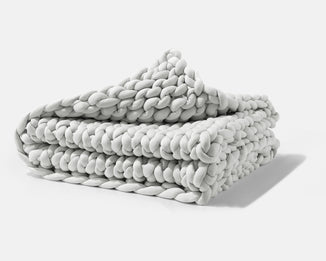
Apr 24, 2023
What Is Core Sleep vs. Deep Sleep?

A good night’s sleep is often hailed as the cornerstone of a healthy lifestyle, playing a crucial role in our physical and mental well-being. Yet, with so much emphasis on sleep, understanding its complexities can often feel overwhelming. Two terms frequently come to the forefront regarding sleep: core sleep and deep sleep. But what do they mean? How are they connected? And why does it all matter for our physical and mental health?
We’ll explore the fascinating world of sleep, the distinctions between core and deep sleep, their respective roles in the sleep cycle and how they contribute to our overall health and everything related to them. By understanding these vital aspects of sleep and how they fit into the sleep cycle, you will be better equipped to optimize your restorative rest and enhance your overall quality of life.
The Sleep Cycle
Overview of the Sleep Cycle
Embarking on a nightly journey, the sleep cycle is a journey of restoration and rejuvenation. Comprising multiple stages, the sleep cycle offers a rich blend of light, deep and REM sleep. Each cycle lasts approximately 90 minutes, repeating four to six times throughout the night.

Non-REM Sleep
Venturing into the non-REM (NREM) sleep world, we encounter four distinct stages: Drowsiness (N1), Light Sleep (N2), Transitionary Deep Sleep (N3) and Deep Sleep (N4). Each stage serves a unique purpose in our restful repose.
- N1: The gateway to the dreamworld, N1 is a brief, transitional stage characterized by drowsiness and light sleep. During this phase, our muscles begin to relax and our brain waves gradually shift from wakefulness to sleep.
- N2: Delving deeper into the world of slumber, N2 represents a more stable, yet still relatively light, sleep stage. Here, our heart rate slows and our body temperature drops as we prepare for the rejuvenating depths of N3.
- N3: A deeper sleep stage, N3 serves as a transition between lighter sleep and the most restorative stage of non-REM sleep. During this phase, brain waves continue to slow down and our bodies further relax in preparation for the essential stage of N4.
- N4: Also known as deep sleep or slow-wave sleep, N4 ushers us into the most regenerative phase of non-REM sleep. Our bodies concentrate on healing, growth and energy replenishment during this part. As we surrender to the embrace of deep sleep, our brain waves slow to a gentle rhythm known as delta waves.
REM Sleep
Transitioning from the stages of non-REM sleep, we arrive at the fascinating landscape of REM sleep. Marked by rapid eye movement (thus the name) and vivid dreams, REM sleep serves as a playground for the mind’s creative endeavors. Beyond its dreamlike qualities, REM sleep is crucial for solidifying memories, fostering emotional regulation and promoting cognitive function.
Enhance Your Sleep Quality with an Infrared Sauna Blanket
NREM vs. REM Sleep
As the night progresses, each successive sleep cycle witnesses an increase in the duration of REM sleep, reaching its peak during the morning hours. This peak serves as the final phase of our restful journey, filling our sleep with vivid dreams, memory consolidation and emotional balance. The interplay between REM and non-REM sleep continues throughout the night, creating a recuperative balance that nurtures our well-being. This seamless blend of sleep stages prepares us to greet the new day with renewed energy and a refreshed state of mind.
Core Sleep vs. Deep Sleep

Definition of Core Sleep
Core sleep refers to the essential portion of sleep needed for an individual to maintain optimal cognitive function and physical health. It typically includes deep sleep (N4) and rapid eye movement (REM) sleep, the most restorative stages of the sleep cycle.
Core sleep generally lasts for about four to six hours per night, during which the body and brain undergo critical processes such as tissue repair, memory consolidation and hormone regulation.
Definition of Deep Sleep
Deep sleep, also known as slow-wave sleep or N4 sleep, is a phase of non-REM sleep characterized by slow, delta brainwave activity. It typically occurs during the first half of the night and is the most rejuvenating stage of sleep. During deep sleep, the body undergoes several important processes, including tissue growth and repair, immune system strengthening and energy restoration.
Comparing Core and Deep Sleep
While core and deep sleep are related, they are not identical concepts. Core sleep encompasses both deep sleep (N4) and REM sleep, representing the minimum amount of sleep needed for proper functioning and overall health. Deep sleep, on the other hand, is a specific stage within the sleep cycle characterized by slow-wave, delta brain activity. It is a crucial component of core sleep, playing a significant role in physical and cognitive restoration processes.
Achieve Relaxation with Your New Weighted Blanket
Tips for Improving Sleep
Sleep Hygiene
Sleep hygiene refers to a set of practices and habits that promote healthy and restful sleep. Establishing a consistent sleep routine and environment can significantly impact sleep quality. Sleep hygiene is a set of practices that can help promote better sleep. Here are a few recommendations for improving sleep hygiene:
- Establish a consistent sleep schedule: Try to go to bed and wake up at the same time every day — even on weekends.
- Create a relaxing sleep environment: Ensure your bedroom is dark, cool and quiet. Use blackout curtains or an eye mask to block out light, and consider using a white noise machine to mask any outside noise.
- Avoid stimulating activities before bed: Avoid screen time, exercise and caffeine in the hours leading up to bedtime.
Relaxation Techniques
Relaxation techniques can help calm your mind and body before bed, making falling and staying asleep easier. Here are a few suggestions for relaxation techniques that you can try:
- Deep breathing: Taking slow, deep breaths can help lower your heart rate and promote relaxation. The 4-7-8 breathing method is a popular technique that involves taking a deep breath for four seconds, holding the breath for seven seconds and then exhaling slowly for eight seconds.
- Progressive muscle relaxation: This technique involves tensing and relaxing different muscle groups in your body, helping to release tension and promote relaxation. To practice progressive muscle relaxation, lie in a comfortable position and systematically tense and relax each muscle group, starting with your toes and working your way up to your head. As you tense each muscle group, hold the tension for a few seconds before releasing it, focusing on the sensation of relaxation that follows.
- Meditation: Meditation involves focusing your mind on a specific thought or object, helping to calm your mind and reduce stress. Guided meditation involves following the instructions of a guide to promote relaxation and reduce stress. Novices can benefit from guided meditation by creating a sense of calm and relaxation that can help them drift off to sleep more easily.
Technology and Sleep
The use of screens before bed can interfere with sleep quality. The blue light emitted by screens can suppress the production of melatonin, a hormone that helps regulate sleep. To manage screen time and improve sleep quality, here are a few recommendations:
- Avoid screens for at least an hour before bed: This allows your body to produce melatonin and prepare for sleep.
- Use a blue light filter: Many smartphones and tablets have built-in blue light filters that can help reduce the impact of screens on sleep.
- Consider limiting screen time during the day: Reducing screen time can help improve sleep quality and promote overall health and well-being.
Sleep-Promoting Accessories

Weighted Blankets
Weighted blankets have gained popularity as a potential aid for better sleep because they promote restful slumber. These blankets typically weigh between five and 30 pounds and are designed to provide deep-pressure stimulation, which can promote relaxation and calmness. Using a weighted blanket could potentially offer the following benefits:
- Reduced anxiety: The deep pressure stimulation provided by a weighted blanket can help reduce feelings of anxiety and promote relaxation.
- Improved sleep quality: Many people report improved sleep quality and a more restful night’s sleep when using a weighted blanket.
- Enhanced comfort: The added weight of a weighted blanket can provide a sense of comfort and security, helping to reduce tossing and turning during the night.
Infrared Sauna Blankets
As the focus on sleep health has grown, infrared sauna blankets have gained recognition as a potential tool for promoting restful and restorative sleep. These blankets use far infrared (FIR) heat to promote relaxation and enhance sleep quality. These are some of the benefits that using an infrared sauna blanket may offer:
- Increased relaxation: The gentle heat provided by an infrared sauna blanket can help promote relaxation and reduce tension in the body.
- Improved circulation: The heat from an infrared sauna blanket can improve blood flow and circulation, helping promote overall health and well-being.
- Detoxification: Infrared sauna blankets are believed to promote detoxification by helping the body release toxins and impurities that can contribute to inflammation, pain, hormonal imbalances and other health issues. By promoting detoxification, these blankets may support overall health and well-being, ultimately leading to better sleep quality.
Sleep Masks
Weighted sleep masks are an innovative and effective tool for improving sleep quality and comfort. These masks are designed to block out light. At the same time, the additional weight provides gentle pressure, creating a dark and calming environment that can promote restful sleep. Here are a few potential benefits of using a weighted sleep mask:
- Improved sleep quality: By blocking out light and applying gentle pressure, weighted sleep masks can promote deeper, more restful sleep.
- Enhanced comfort: The added weight of the sleep mask can provide a sense of comfort and security, helping to reduce tossing and turning during the night.
- Promote relaxation: For those who frequently use screens before bed, a weighted sleep mask can help alleviate eye strain and encourage relaxation, thanks to the combination of darkness and gentle pressure that eases tension and encourages a more peaceful state of mind.
Final Thoughts on Sleep
Understanding the intricacies of core and deep sleep and how they fit into the sleep cycle can greatly enhance our appreciation of the renewing powers of a good night’s sleep. You can achieve better core and deep sleep by recognizing the factors impacting sleep quality and implementing strategies to improve sleep hygiene, relaxation and the sleep environment. And don’t forget about exploring sleep-promoting accessories such as weighted blankets, infrared sauna blankets and sleep masks, which can also enhance your sleep experience.
Ultimately, nurturing your sleep health by understanding and prioritizing core and deep sleep will support your overall well-being, setting the stage for a refreshed and rejuvenated you.
Image Credits:
Stockbakery/Shutterstock.com
G-Stock Studio/Shutterstock.com
Dean Drobot/Shutterstock.com
ReVelStockArt/Shutterstock.com
Your use of this website, its content, and any products obtained through this website is at your own risk. This website, its content, and any products obtained through this website are provided on an “as is” basis, without any warranties of any kind, either express or implied, including warranties of merchantability, infringement of intellectual property, or fitness for any particular purposes. No warranty or representation is made with respect to the completeness, reliability, quality, or accuracy of this website or its content. This website, its content, and any products obtained through this website do not constitute medical treatment and is not a substitute for a medical examination or diagnosis. If you are dealing with a health condition check with your health care provider before using. This website may contain affiliate links that allow us to earn a commission on purchases made through such links. We may accept forms of advertising or sponsorships in connection with this website. There might also be paid topic insertions. We may accept and keep free products, services, and other forms of compensation from others.



